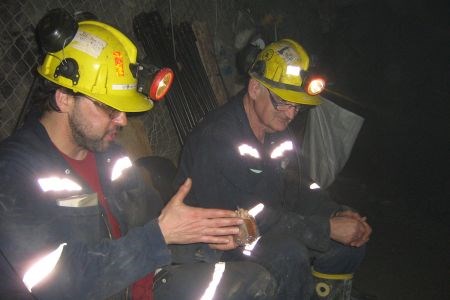With a helping hand from Kirkland Lake Gold Inc., Northern College is helping to address the industry's shortage of skilled miners with its Underground Hard Rock Miner Common Core training program.
Created through a partnership between the school and the mid-tier gold miner, the program has provided an opportunity for those returning to the North in search of permanent full-time employment.
“It is so gratifying to see those who are highly motivated and never had a chance of getting in...this is their big break,” said Rose-Lyne D'Aoust-Messier, training consultant of apprenticeship, workforce development and training at Northern College's Kirkland Lake campus.
It is one of two institutions in northeastern Ontario that offers this type of training for people not privately employed by a mining company. In mid-February, 12 students graduated from the program, six of which have already been scooped up by Kirkland Lake Gold.
The program is unique in its approach in that part of the training occurs at the 3400-foot level of the company's mine. Training also takes place on surface at the mine and in various training facilities at the college, including the gym, where physical training, learning how to lift and proper nutrition are all part of the course's content. Besides providing a working location both above and underground, the company also supplies services like compressed air, tools and some training equipment.
Six years ago, a team at Northern College approached Kirkland Lake Gold to help them create a training program for miners, aware that the company trained individuals for Miner 3, Miner 2 and Miner 1 designations, according to Kirkland Lake Gold CEO Brian Hinchcliffe.
The college wanted to frame the proposal so production mining could be recognized as a trade, which would make it eligible for government funding. Although an official miner's trade status never came to fruition, a syllabus was created after three to four years of collaboration. As well, recognition of the shortage and subsequent need for skilled miners in the industry was translated into financial support through Second Career, a provincial program that assists with tuition fees for qualifying students.
The 12-week program trains students on the same production schedule as the mine: 10-hour shifts, seven days on and seven off. The pupil-teacher ratio is six to one and the training is performed by industry experts, sourced by Kirkland Lake Gold.
D'Aoust-Messier said students get to learn the mining cycle from start to finish, including the health and safety aspect of the job.
Upon completion of the program, they emerge as a Miner 3 on probation, an entry-level position, said Hinchcliffe. He explained it would take three to four years to become a Miner 1, the highest acquired skill-set.
“It is like a full-fledged apprenticeship program with its various stages where one must acquire certain skills before progressing to the next level,” he said. “Every working stope needs to be directed by a Miner 1 as a lead hand.”
Like any training, employment is determined by performance and is not guaranteed. But the fact that the company provides the training site, means they can observe the students in action during the program and can screen them as potential candidates for hire.
Another session will begin on April 4. It works on a demand basis. D'Aoust-Messier said it is a competitive process and there are at least two applicants for every seat.
Those interested in registering must submit an application, attend an information session, and be tested for mechanical reasoning and workplace essential skills, such as reading, writing and basic math calculations. If they meet those requirements, they are invited for an interview.
The program requires people with the ability to lift at least 75 pounds due to the nature of the work. Tuition is $17,500, and those who obtain employment, can expect starting wages between $25 and $35 per hour.
D'Aoust-Messier sees the program as a win-win situation because the college can fulfill its mandate to help the community meet its workforce needs, students can obtain employment and mine sites can have potential workers to fill the gap created by the shortage of miners.




